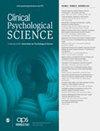Executive Function and Impulsivity Predict Distinct Genetic Variance in Internalizing Problems, Externalizing Problems, Thought Disorders, and Compulsive Disorders: A Genomic Structural Equation Modeling Study
IF 4.1
2区 医学
Q1 PSYCHIATRY
引用次数: 1
Abstract
Individual differences in self-control predict many health and life outcomes. Building on twin literature, we used genomic structural equation modeling to test the hypothesis that genetic influences on executive function and impulsivity predict independent variance in mental health and other outcomes. The impulsivity factor (comprising urgency, lack of premeditation, and other facets) was only modestly genetically correlated with low executive function ( r = .13). Controlling for impulsivity, we found that low executive function was genetically associated with increased internalizing (β = 0.15), externalizing (β = 0.13), thought disorders (β = 0.38), compulsive disorders (β = 0.22), and chronotype (β = .011). Controlling for executive function, we found that impulsivity was positively genetically associated with internalizing (β = 0.36), externalizing (β = 0.55), body mass index (β = 0.26), and insomnia (β = 0.35) and negatively genetically associated with compulsive disorders (β = −0.17). Executive function and impulsivity were both genetically correlated with general cognitive ability and educational attainment. This work suggests that executive function and impulsivity are genetically separable and show independent associations with mental health.执行功能和冲动性在内化问题、外化问题、思维障碍和强迫症中预测明显的遗传变异:一项基因组结构方程模型研究
自我控制的个体差异预示着许多健康和生活结果。在双胞胎文献的基础上,我们使用基因组结构方程模型来检验基因对执行功能和冲动的影响预测心理健康和其他结果的独立方差的假设。冲动因素(包括紧迫感、缺乏预谋和其他方面)与低执行功能只有轻微的基因相关性(r = 0.13)。控制冲动,我们发现低执行功能与内化(β = 0.15)、外化(β = 0.13)、思维障碍(β = 0.38)、强迫性障碍(β = 0.22)和睡眠类型(β = 0.011)增加有关。在控制执行功能的情况下,我们发现冲动性与内化(β = 0.36)、外化(β = 0.55)、体重指数(β = 0.26)和失眠(β = 0.35)呈正相关,与强迫症(β = - 0.17)负相关。执行功能和冲动在基因上都与一般认知能力和受教育程度相关。这项研究表明,执行功能和冲动在基因上是可分离的,并且与心理健康有独立的联系。
本文章由计算机程序翻译,如有差异,请以英文原文为准。
求助全文
约1分钟内获得全文
求助全文
来源期刊

Clinical Psychological Science
Psychology-Clinical Psychology
CiteScore
9.70
自引率
2.10%
发文量
35
期刊介绍:
The Association for Psychological Science’s journal, Clinical Psychological Science, emerges from this confluence to provide readers with the best, most innovative research in clinical psychological science, giving researchers of all stripes a home for their work and a place in which to communicate with a broad audience of both clinical and other scientists.
 求助内容:
求助内容: 应助结果提醒方式:
应助结果提醒方式:


